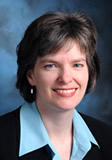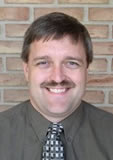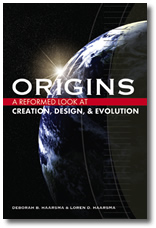DESCRIPTIONS:
Who is this book for? The authors say, "FaithAlive
Resources, the publishing ministry of the Christian Reformed Church,
asked us to write a book ‘for the person in the pew’ on
issues of origins."
• from
the publisher: In this book — the second in the "A
Reformed Look at..." series — scientists
Loren and Deborah Haarsma present a solid Reformed perspective on how
to evaluate the competing ways in which Christians understand the origins
and history of the universe. This book shows how both God's Word
and God's world should be honored in coming to a responsible understanding
of how
God created the universe
and
our world. The authors offer helpful guidance for thoughtful Christians
who are seeking to resolve their differences and come to a deeper, more biblical
understanding
of origins.
• from a book review by
Darrel Falk: Origins:
A Reformed Look at Creation, Design and Evolution is a theological
and scientific analysis of the
variety
of
creation-views
held by evangelical
Christians. Examining these views from the cosmological, geological,
and biological perspectives, it provides a clear, concise introduction
of the issues in a manner that is accessible (and of interest) even at
the high school level. Its impact, however, will extend far beyond
the high school level. This book provides such a clear and broad
perspective on the various approaches that it will be of value even to
those who
have been thinking about origins for many years. Each chapter concludes
with a fine set of discussion questions and several references. Interspersed
throughout the narrative are text-boxes which refer the reader to the
book's excellent
website for a more in-depth analysis of a particular
topic.
• and excerpts from a press
release by Calvin College:
A new book from a pair of Calvin professors strives
to bring more light and less heat to Christian discussions about the
history of the universe. ... The Haarsmas hope their new book... will
help Christians who want to better understand the often controversial
issues connected with life's origins and
development. ...
"The issues around creation, design, and evolution
are complex — and interesting," says Loren Haarsma. But he
adds, "These words mean different things to different people, and they
tend to provoke arguments." The Haarsmas say that's because origins
issues run close to some of life's deepest questions: does God exist, how does
God relate to this universe, how did we get here, and who are we? But,
they say, the culture wars often frame the argument as a false choice: believe
in God or believe in science. "If we only have two sides to choose
from," says Deborah Haarsma, "then believing in God means rejecting
science, and believing what science says means rejecting God. So which
do you choose: God or science? As scientists and Christians, we don't accept
this simplistic choice. In the book, we argue that God and science are
not at war — rather, science is the study of God's creation." .....
In writing their book... they drew on their many experiences of
speaking at churches, and they had that same audience in mind for their book.
... "It's intended for people who aren't scientists and aren't trained
theologians," says
Deborah. "It's for people who are interested in issues of creation,
design and evolution and want to learn more about them. These issues
are often in the news, but news stories are too short or too biased to explain
the real
issues. This book will aid parents and educators who want a Christian resource
that does more than push one point of view."
The Haarsmas note that Christians today hold a range of views about
creation and evolution, and that they encounter that range in their own students
each year. "As Calvin professors," they say, "our goal
is not to tell students which Christians are right and which are wrong. We
want to expose them to the data and arguments and teach them to carefully examine
the strengths and weaknesses of each position. In the same way, with this
book we want Christians to better understand not only their own position, but
the positions of their neighbors
in the pew." .....
Although the Haarsmas describe an array of opinions on origins,
they emphasize a foundation of common Christian
beliefs. They are resolute in their faith in a God who created and governs
the universe, a God who reveals himself to humanity, a God who is a Redeemer,
and a God who inspired the Bible — making it authoritative and sufficient
for teaching us what we need to be saved. Yet as scientists they also believe
that [quoting a CRC statement] "God reveals himself
with full divine authority
in the world of his making as well as in Scripture."
As scientists and Christians, the Haarsmas are willing to
ask difficult questions. "Is it ever appropriate for Christians to
allow what they learn from the study of creation to affect how they interpret
Scripture? Is it ever appropriate for Christians to allow what they learn from
the study of Scripture to affect how they interpret creation?" They
believe that the answer to both questions is a qualified yes, but that these
things can be done in good ways and bad ways. .....
In their book they describe a number of ways in which
Christians interpret the early chapters of Genesis. ..... In their chapters...
on human origins, they not only summarize the scientific data, but also look
at key theological issues — the human soul, the image of God, original
sin, and human mortality before the Fall. ... They present several views held
by fellow Christians and then discuss the theological and scientific challenges
for each view. ... They write, "In all the views presented in this chapter,
God is the Creator of humanity. The differences among the views are in
how God accomplished it." The Haarsmas say that this foundational
belief in God as the creator and sustainer is at the heart of how they do science. And
their hope is that this approach will ring in their new book and resonate with
readers.
|
 |
REVIEWS:
• This book is on ASA's list of Recommended
Books because it is "valuable as an
introduction to the field for the person in the pew, high school and
college students." For several months it was featured
in the
"Bookstore" on the ASA
homepage and is strongly recommended...
• by Edward Davis, member of ASA's Executive Council (*) — "Loren
and Deb Haarsma have extensive experience speaking and teaching about science
and Christian faith to a variety of audiences
and in a variety of venues. Their hard work is now available in
a new book from Faith Alive Christian Resources. It is hard to
find good helpful
materials for Christian schools and home schooling families on issues
of science and faith. We now have, in my opinion, the best answer
for that problem. In a word, this book is splendid. I commend
the authors for their courage to be faithful to both science and Christian
beliefs." — * Professor of History of
Science, Messiah College (and author of "Intelligent
Design on Trial" in Religion in the News, Winter
2006)
• by Craig Rusbult, editor of ASA's website for Whole-Person
Education — This excellent book is the best introductory
overview I've seen about the science, philosophy, and theology of origins. I
place a high value on accurate understanding & respectful
attitudes and the authors clearly describe a wide range of views accurately,
with respect. If you're a "person in the pew" this book will
help you learn a lot. And if you're experienced in this area, it will
coherently summarize much of what you know, and more.
• and in ASA's journal (June 2008) a favorable book
review by Darrel Falk, Professor of Biology at Point Loma Nazarene University, begins with a
book description and concludes, "I have
been waiting for a book like this for a long time. I have wanted a
book that clearly lays out the options in a textbook-like fashion at the
introductory level, one which allows
the
reader
to come to his or her own conclusions without a sense of coercion, and one
which provides a balance between theological and scientific considerations. This
comes as close as any I have seen to being that book. I recommend it
highly."
• praise from the book's back cover and publisher's website:
"Origins is
a masterful book. It
clearly and readably introduces the many different positions that Christians
hold on creation and evolution, and the many complex issues involved,
without caricature or oversimplification." — John
Cooper, Professor of Philosophical Theology, Calvin Theological Seminary
"I have read a number of books that discuss
Christianity and origins, but none are as thorough in exploring the range
of views that exist within the Christian community. This is a book
that should be on the shelf of any Christian interested in going beyond
the simplistic view that one must choose either faith or science when
discussing origins." — John
Zwart, Professor of Physics, Dordt College (2004 President of the
Iowa chapter of the American Association of Physics Teachers)
"Origins: A Reformed Look at Creation,
Design, and Evolution offers a thoughtful, helpful study of the
relationship between science and Christianity, focusing on various
Christian approaches to understanding the origins of the universe and
the human race. Especially strong are its presentation of ways
in which science and biblical interpretation can enrich one another,
its analysis and evaluation of Intelligent Design, and its evenhanded,
thought-provoking discussion of various views on human origins, the
fall, and original sin. This book will be helpful for those who,
believing that both the universe and the Bible make God known to us,
want to understand the relationship between these two means of revelation." — Ronald
Feenstra, Heritage Professor of Systematic and Philosophical Theology,
Calvin Theological Seminary
• and from others in the Christian community:
"The
Haarsmas have provided the church with a timely, rare, and valuable gift. Origins displays
that rare combination of comprehensive topical analysis (scientific and
biblical) with clear
explanation for
laypersons. I strongly recommend the book to Christians, and especially
to Christian educators, who seek to understand evolutionary science,
without fear and without scientific or theological compromise." — Stephen
Matheson, Professor of Biology, Calvin College
"Thoughtful
Christians of all kinds will enjoy this clear and readable book. The
authors combine reverence for the word of God in Scripture
with a deep
understanding
of modern natural science. The result is a very helpful guide for churches,
students and ministers thinking through contemporary debates surrounding
the history of
God's creation." — Alan Padgett, Professor of
Systematic Theology, Luther Seminary (author of Science and the Study of
God: A Mutuality Model for Theology and Science)
"This book carefully describes important scientific
concepts with helpful examples; as a non-scientist I still found the
material very
clear to understand. Even
more remarkable is the Haarsmas' theological depth; as a theologian I
believe they provide the key questions that Christians face about origins. Their
descriptions of several different answers to these questions, along with evaluations
of
possible strengths and weaknesses for each view, seem consistently accurate
and fair. This study honors God's work in creation and in Scripture;
now it can be an important part of God's work in the church." — Daniel
Treier, Professor of Theology, Wheaton College (co-editor, with Timothy
Larsen, Cambridge Companion to Evangelical Theology)
"The Haarsmas seek to be as even-handed as possible, presenting each reconciliation strategy in a positive light, even as they critique each position. They openly admit that they are not fully satisfied with any of the strategies, but they are still seeking reconciliation. For them, the process of discussion and seeking is more important than absolute certainty." — Rebecca Flietstra, Professor of Biology, Point Loma Nazarene University {review}
"There are not many books on the topic of creation and evolution that I would wholeheartedly recommend, but Origins by Deborah and Loren Haarsma is one of them. ... Perhaps the biggest challenge in the church today, when it comes to this topic, is to persuade Christians to tolerate the views of other Christians whose view of origins/creation/evolution/design differs from their own. This book does as much as any one book could be expected to do to meet this challenge. I hope it is widely read and discussed." — Timothy Chow, Dept of Math, Massachusetts Institute of Technology. {review}
In a negative review from a young-earth perspective, Joseph Pipa says "there is little that is ‘Reformed’ about their perspective, and the range of scientific options offered is weighted in favor of evolution." He is very disappointed because "the authorsí purpose is to establish that there is no conflict between old-earth science and the Bible," and he concludes that "a better model for scientific research on origins... is found in the work of Christian scientists that begin with the scriptural accounts of creation and the Flood and constructs scientific models compatible with Godís revelation." {review}
• and from customers
at amazon.com who say "essential reading for Christians interested
in origins" & "highly recommended" & "one of the best overviews of
the issues" & "presents the spectrum of Christian views on Genesis
and origins."
|


